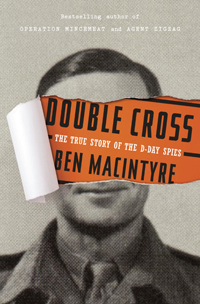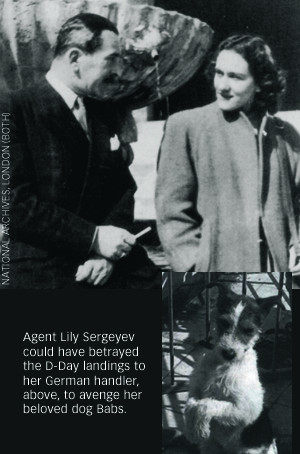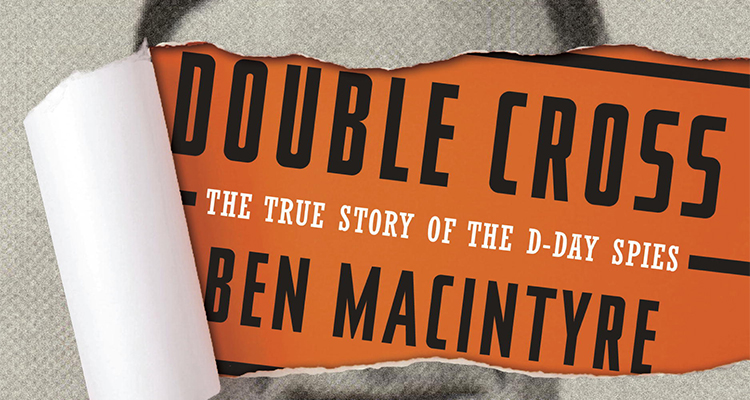 Double Cross
Double Cross
The True Story of the D-Day Spies
By Ben Macintyre. 416 pp.
Crown, 2012. $26.
While the Allies were securing their tenuous beachhead at Normandy, the Germans kept the bulk of their forces north of the Seine River, expecting the invasion’s main attack to arrive later in the Pas de Calais region. The Germans had fallen for Operation Fortitude, a massive Allied deception that hinged on one of the oddest casts of characters ever assembled for a military operation.
At the heart of Fortitude was Britain’s Double Cross system, which “turned” German spies to the Allied cause, then used them to feed their German handlers misinformation mixed with enough “chicken feed” to keep their reports credible. Its nucleus consisted of five spies: a bisexual Peruvian playgirl, a diminutive Polish fighter pilot, a mercurial Frenchwoman, a Serbian playboy, and an eccentric Spanish chicken farmer. Together with their MI5 controllers, this motley crew held D-Day’s fate in their hands. The story’s outline is long familiar; some agents eventually published memoirs. But only with author Ben Macintyre’s scintillating account has this complex human drama, with all its tortuous twists and turns, finally received the cinematic treatment it deserves.
Macintyre’s previous bestseller Mincemeat unveiled the full machinations behind the deception of the same name, which wrong-footed the Germans about the invasion of Sicily. Once again combining narrative drive with vivid portrayals of the principal actors, Macintyre draws on MI5 files to lead us skillfully through the intricate web of falsehoods the Double Cross agents wove, as well as the vast support network of deception (phantom armies, phony materiel, faked radio chatter) their handlers created to keep the Germans hooked. What graphically emerges is how close to disaster Fortitude sometimes came, thanks to the foibles of the agents involved. This is edge-of-the seat stuff—especially since the trustworthiness and motives of these spies were always opaque. The whole operation required not just intellectual brilliance but nerves of steel on the part of those actually running it, like Tommy “Tar” Robertson, the Mincemeat vet who conceived Fortitude.
 Any of Macintyre’s bizarre characters merits a spotlight here, but the most volatile was Lily Sergeyev, codenamed Treasure. A vivacious French journalist of Russian extraction, Sergeyev was recruited in occupied Paris by the Germans and sent to Madrid with instructions to make her way to Britain. Instead she handed herself over to the British, who flew her to London and set her up in a Kensington flat. By April 1944 she was transmitting dozens of deceptive messages using a radio set German intelligence gave her, delighting her British controllers. Then three weeks before D-Day, they discovered Sergeyev had not told them of a code that she could use to warn the Germans if her messages were at the behest of MI5. She refused point-blank to reveal it, leaving Robertson’s team white-knuckled—had she used it or not?—until the D-Day landings safely concluded.
Any of Macintyre’s bizarre characters merits a spotlight here, but the most volatile was Lily Sergeyev, codenamed Treasure. A vivacious French journalist of Russian extraction, Sergeyev was recruited in occupied Paris by the Germans and sent to Madrid with instructions to make her way to Britain. Instead she handed herself over to the British, who flew her to London and set her up in a Kensington flat. By April 1944 she was transmitting dozens of deceptive messages using a radio set German intelligence gave her, delighting her British controllers. Then three weeks before D-Day, they discovered Sergeyev had not told them of a code that she could use to warn the Germans if her messages were at the behest of MI5. She refused point-blank to reveal it, leaving Robertson’s team white-knuckled—had she used it or not?—until the D-Day landings safely concluded.
What drove Sergeyev to a near triple-cross? The love of her life: Babs, her small terrier-poodle. When Sergeyev flew to London, Babs fell afoul of Britain’s strict quarantine laws. Sergeyev was promised that her pet would follow her, but Babs was almost certainly disposed of by an over-worked MI6 agent in Madrid. Sergeyev was furious, and the code was a potentially lethal weapon of revenge. Fortunately for the Allies, she never deployed it, although the close-run affair required expert handling. Summarily dismissed once Allied troops were ashore, Sergeyev ended up as a Detroit housewife, childless but with many dogs. None of her neighbors
had the slightest idea who she was, or what she had done.
That the Normandy landings might have failed because of a small dog is only one of this book’s many teasing revelations. Double Cross forcefully reminds us that history can be decided by the most seemingly trivial of things.
David Stafford is projects director at Edinburgh University’s Centre for the Study of the Two World Wars and Leverhulme Emeritus Professor in the university’s School of History, Classics, and Archaeology. He is a noted scholar on British intelligence and espionage in World War II.





